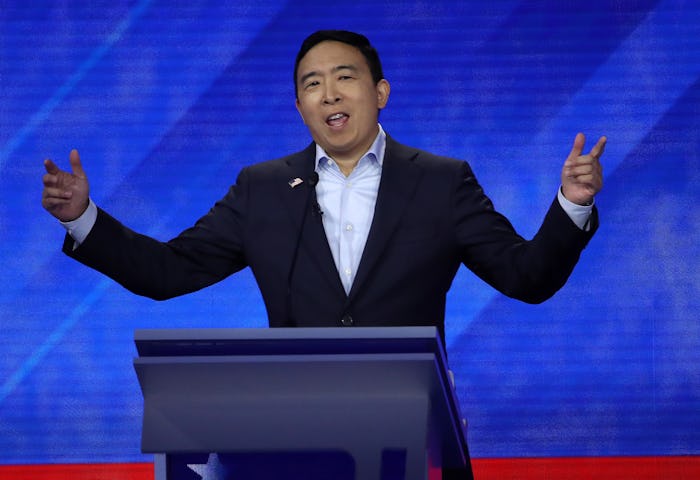News

So... What Is Universal Basic Income?
Democratic presidential candidate Andrew Yang made quite the impression Thursday night when he once again brought up universal basic income. Not only that, but he revealed his campaign would be awarding ten "Freedom Dividends" of $1,000 — which basically crashed his website. But many debate viewers probably wondered: What is universal basic income?
The entrepreneur from New York has made the concept of universal basic income (UBI) the focus of his campaign, and he's dubbed it "Freedom Dividend," according to NPR. Specifically, Yang has a plan to provide $1,000 per month to every U.S. citizen age 18 and older. On Thursday, Sept. 12 — in a clever way to get people to visit his campaign's website — Yang revealed a contest for ten families to begin receiving this dividend for a year, Time reported. A campaign aide told the publication that these recipients will be randomly selected.
“It’s time to stop trusting politicians and start trusting ourselves — so I’m going to do something unprecedented tonight,” Yang told the debate audience and at-home viewers on Thursday. “My campaign is now going to give a Freedom Dividend of $1,000 a month to ten American families for an entire year, someone watching this at home right now.”
Cue: Twitter erupted and Yang's campaign website practically crashed minutes later.
It's worth noting the idea of basic universal income isn't exactly a new one. One of the reasons it's so relevant these days, however, is because of the fear that automation will put millions of people out of work, according to CNBC. Another motivating factor for implementing BUI is the extreme wealth inequality in the U.S. The thought is cash payments will help people whose jobs were replaced by robots, as well as to help even things out in the wealth distribution department.
If you're like me, then you might be thinking something like this: Who wouldn't want to get a check every month? Well, it turns out — like most things political — not everyone is a fan of basic universal income. A February 2018 Gallup survey, for example, shows that 48 percent of Americans support BUI and 52 percent are against it.
The issue of how to pay for a basic universal income is one of many criticisms of the concept.
Yang's plan lays out how money for the Freedom Dividend would be drawn from four different sources: 1) Current spending on welfare programs; 2) a Value Added Tax (VAT) — or a tax on the production of goods or services a business produces; 3) new revenue that would result from the economy growing because of UBI; 4) Taxes on top earners and pollution.
Although the legality of Yang's $1,000 giveaway to ten families for a year is iffy — at least legally — his focus on universal basic income and subsequent Freedom Dividend plan have certainly attracted a lot of attention. It'll be interesting to see if Yang's popularly surge will continue in light of his promises during the third round of Democratic debates on Thursday.